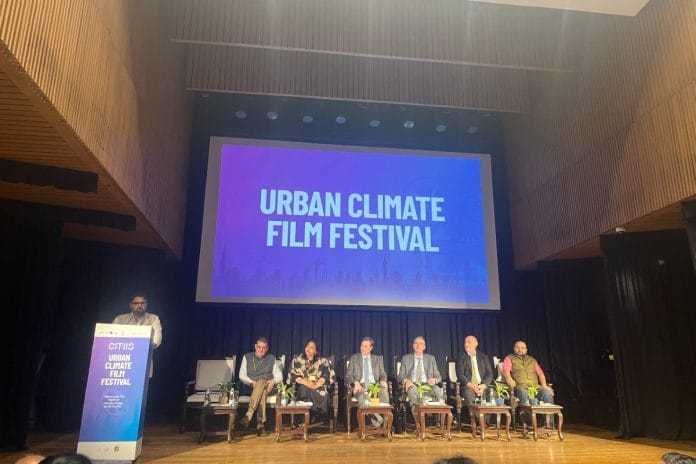New Delhi: Hundreds flocked to the Alliance Française over the weekend to attend the ‘Urban Climate Film Festival’ — a first-of-its-kind screening of films on urbanisation and the impact of climate change on cities. The idea behind the two-day event organised by the National Institute of Urban Affairs (NIUA), a Delhi-based think tank under the aegis of the Ministry of Housing and Urban Affairs, was to ‘de-jargonise the climate world to decarbonise’.
During the event held from 25-26 March, audiences were shown 11 shortlisted films from nine countries that highlighted the crippling effects of climate change on urban lives.
The festival opened with a French film, Rewild, which narrated the story of individual-led initiatives to limit human activities in a bid to resuscitate land and undo the damages caused by deforestation.
The final movie, SEED: The Untold Story, narrated the story of America through seeds which it depicted as ‘time capsules’ and ‘living embryos’ that keep human civilisation alive. It also criticised genetically modified crops and actions of fertiliser and agri corporations.
Speaking at the opening of the festival Friday, NIUA director Hitesh Vaidya said, “Climate change is one of the many urban challenges the world is facing. And while films around the world are advocating climate issues, I think the time has come to take a further action-oriented approach.”
Vaidya emphasised that “climate issues or climate language has to become a language of cities” and recalled that the idea to organise a festival for films on climate change had its genesis two years earlier during a discussion on showcasing India’s culture and heritage.
“When the U-20 (Urban 20 is a city diplomacy initiative comprising cities from G20 countries) came, our focus on climate increased. We thought let’s put up a call for a climate film festival,” he explained.
Entries for films from around the world opened in January with an early-March deadline. Of the 150 submissions it received in a span of 45 days, the NIUA shortlisted 27 movies from 12 countries.
Also Read: Equitable climate action needed to secure future, says IPCC in latest report
‘Climate change not just about fancy graphs’
Naim Keruwala, program director at NIUA, said the festival will now travel to four other cities. “We will be in Mumbai in April, Bengaluru in May, Kolkata in June, and Ahmedabad in July,” he said at the opening ceremony Friday, adding that the NIUA is considering hosting the ‘Urban Climate Film Festival’ in other cities in light of the response to it in Delhi.
“More than 500 people have come or left this hall in the last two days,” he said in his closing remarks Sunday.
Talking about his experience leading up to the festival, Keruwala said he was told during the selection process that “some of the films are so scary”. To that, he responded: “Yeah.. that’s the reality. That’s what these films are trying to tell us. Much is said and done about it everyday and a lot of it has also gone unheard, unseen and to break this gap to a certain extent, we decided to harness the power of films by organising this film festival.”
He added that producing meaningful cinema was not enough and that it was necessary to take such cinema to the masses.
“When we go on field, we see that climate change is not just about some fancy graphs, people’s lives are getting impacted on a daily basis. There are people who are losing their lives, their livelihoods, they are losing their houses. It’s an actual emotional issue. Then we thought what’s better than organising a film festival,” Keruwala said.
Former NITI Aayog chief Amitabh Kant, special guest at the opening ceremony, termed climate change “the biggest challenge we face in today’s world” despite the world going through “turbulent times”.
Underscoring his point by citing figures on poverty, unemployment, debt crisis and recession, he said, “The challenge is that today’s cities have to be far more sustainable. They have to be built around walking and cycling, they have to be built around public transportation, they have to be built for drainage, sewage, solid waste.”
“For a country like India, which is beginning its process of urbanisation, we will see 500 million people getting into the process of urbanisation in the next 4-5 decades. That means you will be creating two Americas in the next five decades and a Chicago every 3-4 years,” said Kant who is currently India’s G20 Sherpa during its year-long presidency.
(Edited by Amrtansh Arora)
Also Read: Climate change intensifies human-wildlife conflict, says Nature Climate Change study






